Is the EU at risk of breaking up?
- Published
- comments
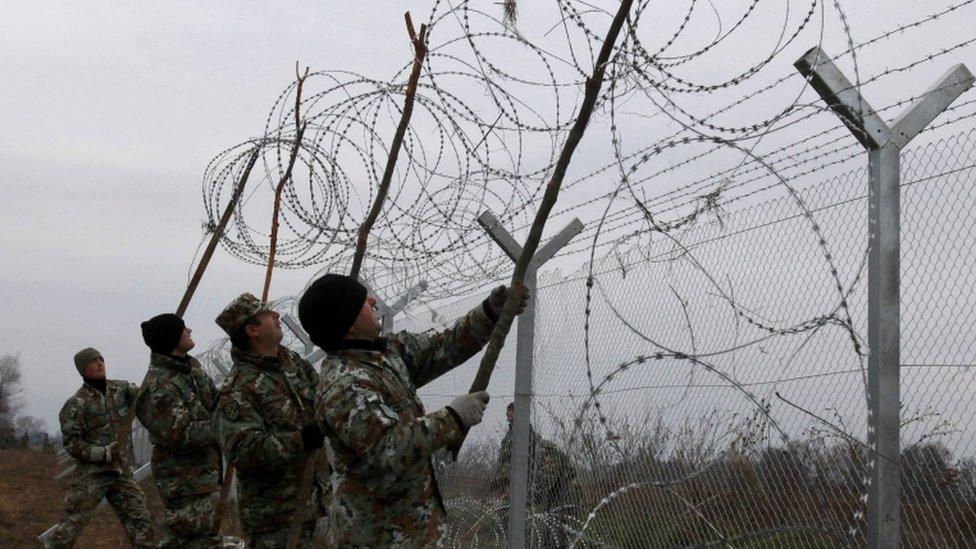
Macedonia is building a razor-wire fence on its border
For the past 10 days, Europe's leaders have been engaged in a bout of gloom.
They openly admit Europe has lost control of the migrant crisis, and they fear for the future of the European project, external itself.
French Prime Minister Manuel Valls said: "Europe could lose its historical footing, and the project could die quickly. Things could fall apart in months"
German Finance Minister Wolfgang Schaeuble said: "If the Schengen system [of border free travel] is destroyed, Europe will be seriously endangered"
Dutch Prime Minister Mark Rutte said Europe's leaders had only "six to eight weeks to save Schengen"
European Commission President Jean-Claude Juncker talked of a "last chance" for Europe. "Without Schengen, the euro has no point," he said
German Chancellor Angela Merkel, external said: "No-one can pretend that you can have a common currency without being able to cross borders relatively easily"
Certainly, the Schengen agreement - which guarantees freedom of movement and is one of the pillars of European unity - is being widely ignored as fences go up and border controls reappear.
On Monday Greece was even warned that it could find itself excluded from the Schengen area if the flow of migrants is not stemmed.
But do these leaders really believe the European Union itself is at risk?
It strains credibility to believe the single market is at risk and European project could fall apart in months.
But there is an element of fear seeping through the corridors of the Berlaymont building in Brussels and the Bundestag in Berlin.
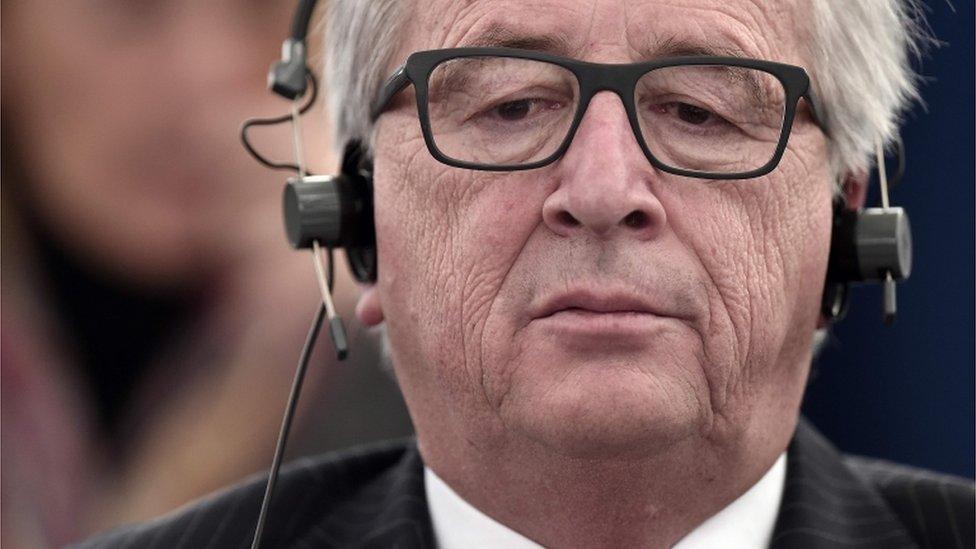
Jean-Claude Juncker has warned of a "last chance" for Europe
At the heart of the crisis, the problem is simple: "We cannot cope," Mr Rutte said,, external "with the numbers any longer."
In 2015, 1.83 million migrants came to Europe, of which 1.1 million sought asylum in Germany, external.
More than 35,000 have crossed from Turkey into Greece since the start of the year.
Merkel accused
German leaders have repeatedly said migrants are a European problem, but that analysis is not universally shared.
Many politicians in Eastern and Central Europe incline to a different script: that Mrs Merkel encouraged large numbers of migrants by essentially laying out a welcome mat.
The Germans, according to this narrative, provided the pull factor but are insisting others share the burden of dealing with the crisis.
So there are divisions and mistrust.
The European Commission believed the answer lay in sharing out the refugees between countries.
It was agreed 160,000 migrants would be resettled across Europe.
Only 331 have been moved so far.
Countries - irritated by majority voting - have simply ignored the plan.
Mrs Merkel made a big bet on Turke, externaly: that in exchange for €3bn and the offer of visa-free travel, Turkey would slow the numbers crossing the narrow straits to Greece.
But not all the funds have been forthcoming, and Turkey has frustrated Europe's leaders with its lack of action.
In the meantime, countries began implementing their own measures.
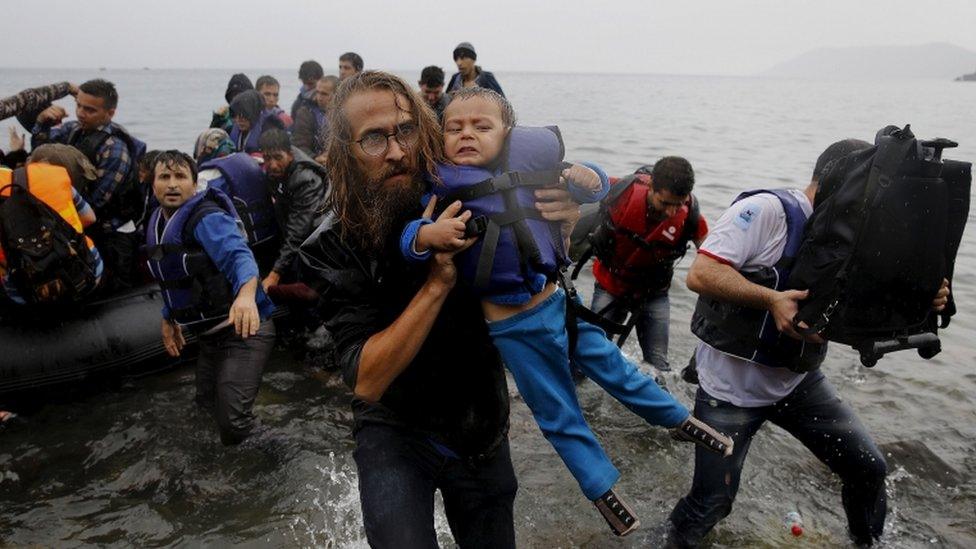
Migrants continue to risk their lives trying to travel from Turkey to Greece
Hungary built a fence, external. Germany, external, Austria,, externalFrance, external, Denmark, Sweden and Norway, external all began introducing checks at their borders.
It amounted to a suspension of the Schengen agreement.
They insisted the controls were temporary, but they are looking to extend them.
Reception camps
Further plans have continued to cascade out of the commission's meetings.
There would be a compulsory sharing out of refugees across the EU - even though it has shown little evidence of this working so far.
Secondly, Greece and Italy - the two countries where most of the migrants first arrived - would create hotspots, or reception camps, where people would be registered.
Those who did not qualify for asylum would be turned around.
But in Greece, only one out of five planned camps has been built.
And if the migrants are refused asylum, it is unclear which force will physically remove them from Europe and where they will go.
German Vice-Chancellor Sigmar Gabriel hinted aid would be withdrawn from North African countries if they did not take back rejected asylum seekers.
Many of Europe's leaders believe it will be impossible to save Schengen if Europe's external borders are not secured allowing potential refugees to be screened and processed and not just waved through to Austria and Germany.
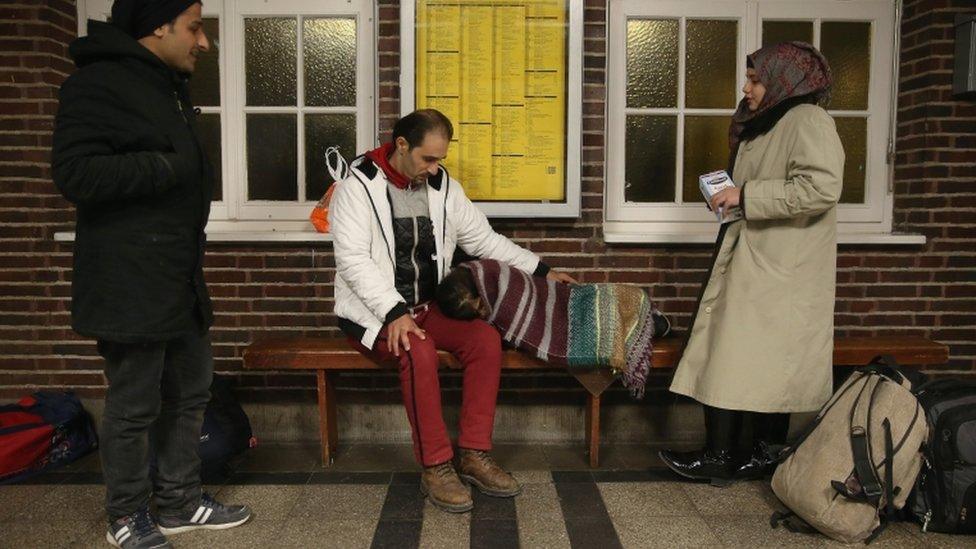
Migrants hoping to travel to Denmark have found stricter controls on the border
But they have lost faith in Greece's ability to do this, so the commission has proposed a European Border and Coast Guard force, which in an emergency could overrule national governments.
Such a force would impinge on sovereignty.
Arguments are likely to be fierce before it is operational, and it is unclear what would happen if governments objected.
Pressure is growing on Greece to cooperate.
There is talk of Greece having to leave Schengen if it does not agree to take the border guards, or that the Schengen border could be moved - maybe to Slovenia - so Greece no longer forms part of the EU's external frontier.
But it is not just a case of Greece being awkward.
Greek Prime Minister Alexis Tsipras fears if Greece starts processing all the migrants and denying some of them asylum, the country could become "a massive refugee camp".
And if the border moved to a country such as Slovenia, then there too a no-man's land for stranded refugees could develop.
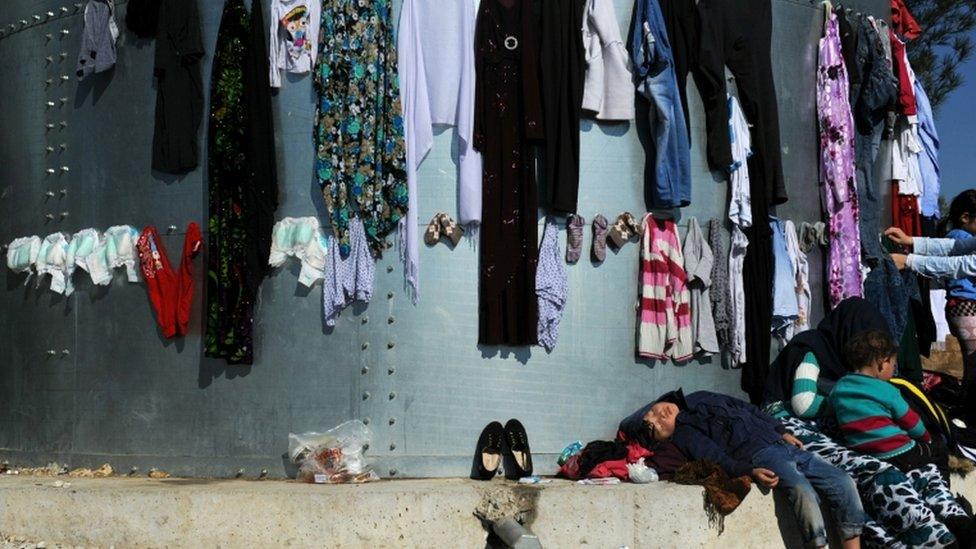
Greece has set up only a small number of migrant registration camps
In the meantime, countries act unilaterally. Macedonia, on Greece's northern border, is building a 10ft (3m) razor-wire fence, external.
Austria has decided to cap the number of asylum seekers it will accept in 2016, at 37,500.
All the time, the pressure grows on Mrs Merkel to cap the number Germany will accept.
She continues to refuse. Not only would it be an acceptance her policy had failed - but she fears the refugee problem would be pushed back into Eastern Europe and the Balkans, further undermining the Schengen agreement.
The pressure the German chancellor is under was reflected in the words of the German President Joachim Gauck, who said refugee quotas might be "morally and politically necessary".
Even in the winter months the numbers of migrants has not subsided.
Some 2,000 are continuing to arrive each day, which - some of Europe's leaders insist - is unsustainable.
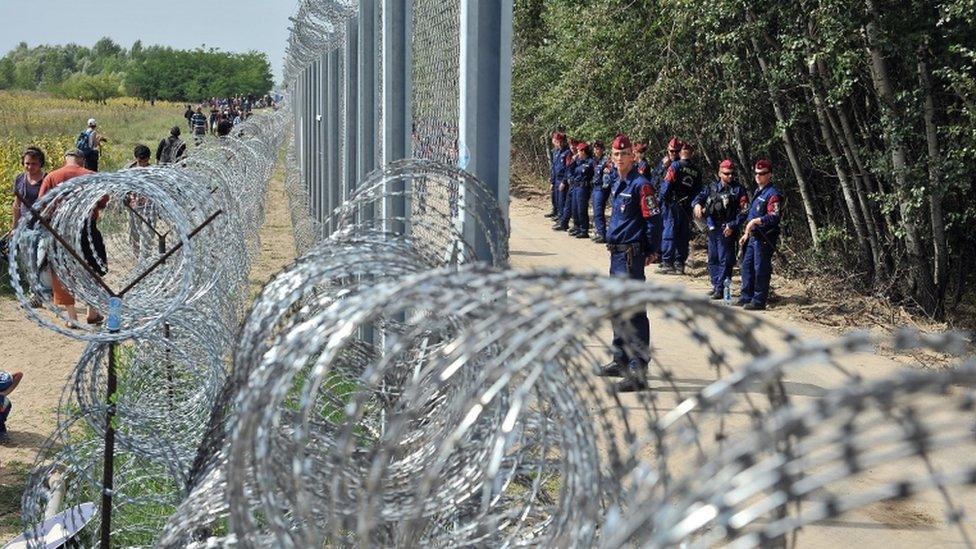
Hungary has erected a fence on its border with Serbia
What this chapter of events underlines is how difficult it has been to forge a European response to the crisis.
It raises questions about German leadership.
It reflects the pressure on politicians to look after their own national interests by slowing down migrant numbers.
It has exposed divisions between Eastern Europe and the northern countries.
It reflects different values, a resistance in the East to embrace a multicultural society they have little experience of.
And that clash of values is also evident in Germany, where the Bavarian leader Horst Seehofer - an ally of Mrs Merkel - questions what more refugees will do to the country.
"That is then a different society. And the people don't want Germany or Bavaria to become a different society," he said.
Way forward
So what will happen? The answer almost certainly does not lie in the commission's plans.
EU countries will have to use their financial power to persuade other countries to take back failed asylum seekers.
A huge investment - as the German Finance Minister has suggested - will have to be made in countries such as Turkey, Jordan and Lebanon to persuade them to keep people in camps but in much better conditions than they are at present.

In the longer term, it will probably require some sort of Marshall plan to prevent people fleeing the countries on the rim of the Mediterranean.
It may be that, like Canada, the EU will take only refugee families from Syria, rather than young men.
And it may be, as some politicians are suggesting, the EU will have to demonstrate a greater willingness to deport failed seekers of asylum.
The EU's immense achievement of helping to sow peace in Europe and spread democracy is not at risk - but the migrant crisis is tearing at the fabric of a community of shared values.